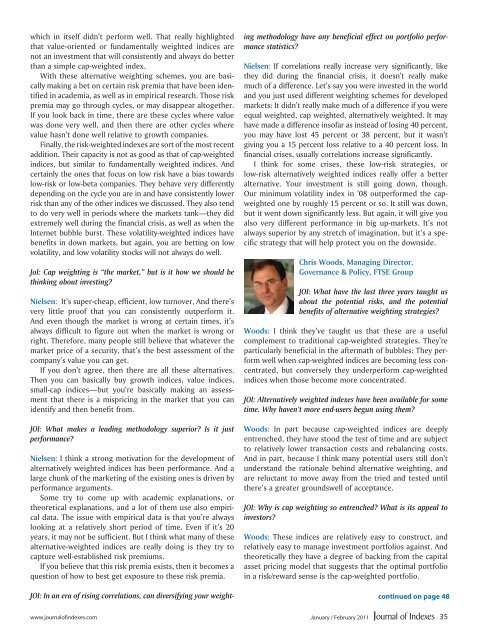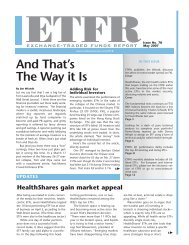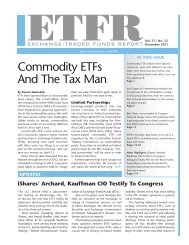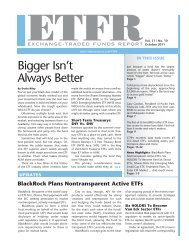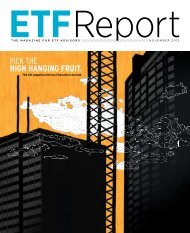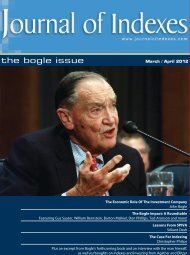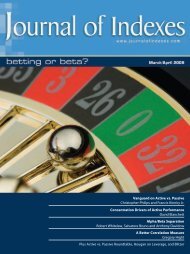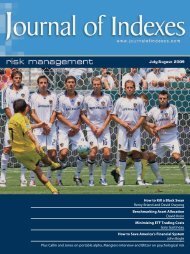Improved Beta? - IndexUniverse.com
Improved Beta? - IndexUniverse.com
Improved Beta? - IndexUniverse.com
Create successful ePaper yourself
Turn your PDF publications into a flip-book with our unique Google optimized e-Paper software.
which in itself didn’t perform well. That really highlighted<br />
that value-oriented or fundamentally weighted indices are<br />
not an investment that will consistently and always do better<br />
than a simple cap-weighted index.<br />
With these alternative weighting schemes, you are basically<br />
making a bet on certain risk premia that have been identified<br />
in academia, as well as in empirical research. Those risk<br />
premia may go through cycles, or may disappear altogether.<br />
If you look back in time, there are these cycles where value<br />
was done very well, and then there are other cycles where<br />
value hasn’t done well relative to growth <strong>com</strong>panies.<br />
Finally, the risk-weighted indexes are sort of the most recent<br />
addition. Their capacity is not as good as that of cap-weighted<br />
indices, but similar to fundamentally weighted indices. And<br />
certainly the ones that focus on low risk have a bias towards<br />
low-risk or low-beta <strong>com</strong>panies. They behave very differently<br />
depending on the cycle you are in and have consistently lower<br />
risk than any of the other indices we discussed. They also tend<br />
to do very well in periods where the markets tank—they did<br />
extremely well during the financial crisis, as well as when the<br />
Internet bubble burst. These volatility-weighted indices have<br />
benefits in down markets, but again, you are betting on low<br />
volatility, and low volatility stocks will not always do well.<br />
JoI: Cap weighting is “the market,” but is it how we should be<br />
thinking about investing?<br />
Nielsen: It’s super-cheap, efficient, low turnover, And there’s<br />
very little proof that you can consistently outperform it.<br />
And even though the market is wrong at certain times, it’s<br />
always difficult to figure out when the market is wrong or<br />
right. Therefore, many people still believe that whatever the<br />
market price of a security, that’s the best assessment of the<br />
<strong>com</strong>pany’s value you can get.<br />
If you don’t agree, then there are all these alternatives.<br />
Then you can basically buy growth indices, value indices,<br />
small-cap indices—but you’re basically making an assessment<br />
that there is a mispricing in the market that you can<br />
identify and then benefit from.<br />
JOI: What makes a leading methodology superior? Is it just<br />
performance?<br />
Nielsen: I think a strong motivation for the development of<br />
alternatively weighted indices has been performance. And a<br />
large chunk of the marketing of the existing ones is driven by<br />
performance arguments.<br />
Some try to <strong>com</strong>e up with academic explanations, or<br />
theoretical explanations, and a lot of them use also empirical<br />
data. The issue with empirical data is that you’re always<br />
looking at a relatively short period of time. Even if it’s 20<br />
years, it may not be sufficient. But I think what many of these<br />
alternative-weighted indices are really doing is they try to<br />
capture well-established risk premiums.<br />
If you believe that this risk premia exists, then it be<strong>com</strong>es a<br />
question of how to best get exposure to these risk premia.<br />
JOI: In an era of rising correlations, can diversifying your weighting<br />
methodology have any beneficial effect on portfolio performance<br />
statistics?<br />
Nielsen: If correlations really increase very significantly, like<br />
they did during the financial crisis, it doesn’t really make<br />
much of a difference. Let’s say you were invested in the world<br />
and you just used different weighting schemes for developed<br />
markets: It didn’t really make much of a difference if you were<br />
equal weighted, cap weighted, alternatively weighted. It may<br />
have made a difference insofar as instead of losing 40 percent,<br />
you may have lost 45 percent or 38 percent, but it wasn’t<br />
giving you a 15 percent loss relative to a 40 percent loss. In<br />
financial crises, usually correlations increase significantly.<br />
I think for some crises, these low-risk strategies, or<br />
low-risk alternatively weighted indices really offer a better<br />
alternative. Your investment is still going down, though.<br />
Our minimum volatility index in ’08 outperformed the capweighted<br />
one by roughly 15 percent or so. It still was down,<br />
but it went down significantly less. But again, it will give you<br />
also very different performance in big up-markets. It’s not<br />
always superior by any stretch of imagination, but it’s a specific<br />
strategy that will help protect you on the downside.<br />
Chris Woods, Managing Director,<br />
Governance & Policy, FTSE Group<br />
JOI: What have the last three years taught us<br />
about the potential risks, and the potential<br />
benefits of alternative weighting strategies?<br />
Woods: I think they’ve taught us that these are a useful<br />
<strong>com</strong>plement to traditional cap-weighted strategies. They’re<br />
particularly beneficial in the aftermath of bubbles: They perform<br />
well when cap-weighted indices are be<strong>com</strong>ing less concentrated,<br />
but conversely they underperform cap-weighted<br />
indices when those be<strong>com</strong>e more concentrated.<br />
JOI: Alternatively weighted indexes have been available for some<br />
time. Why haven’t more end-users begun using them?<br />
Woods: In part because cap-weighted indices are deeply<br />
entrenched, they have stood the test of time and are subject<br />
to relatively lower transaction costs and rebalancing costs.<br />
And in part, because I think many potential users still don’t<br />
understand the rationale behind alternative weighting, and<br />
are reluctant to move away from the tried and tested until<br />
there’s a greater groundswell of acceptance.<br />
JOI: Why is cap weighting so entrenched? What is its appeal to<br />
investors?<br />
Woods: These indices are relatively easy to construct, and<br />
relatively easy to manage investment portfolios against. And<br />
theoretically they have a degree of backing from the capital<br />
asset pricing model that suggests that the optimal portfolio<br />
in a risk/reward sense is the cap-weighted portfolio.<br />
continued on page 48<br />
www.journalofindexes.<strong>com</strong> January / February 2011<br />
35


